LTC6948IUFD-1#TRPBF
Overview
Category
The LTC6948IUFD-1#TRPBF belongs to the category of integrated circuits (ICs).
Use
It is commonly used in electronic devices for frequency synthesis and clock generation.
Characteristics
- High precision and stability
- Wide frequency range
- Low phase noise
- Low power consumption
Package
The LTC6948IUFD-1#TRPBF is available in a small form factor package, such as QFN or DFN.
Essence
This product is essential for generating accurate and stable frequencies in various electronic applications.
Packaging/Quantity
The LTC6948IUFD-1#TRPBF is typically packaged in reels or trays, with a quantity of 250 or 1000 units per package.
Specifications and Parameters
- Frequency range: X Hz to Y Hz
- Output power: Z dBm
- Supply voltage: V volts
- Operating temperature range: -40°C to +85°C
- Input/output impedance: R ohms
Pin Configuration
The LTC6948IUFD-1#TRPBF has a detailed and complete pin configuration as follows:
- Pin 1: VCC
- Pin 2: GND
- Pin 3: RF IN
- Pin 4: RF OUT
- Pin 5: VCO TUNE
- Pin 6: REF IN
- Pin 7: LD
- Pin 8: MUXOUT
- Pin 9: N/C
- Pin 10: N/C
Functional Characteristics
The LTC6948IUFD-1#TRPBF offers the following functional characteristics:
- Frequency synthesis
- Phase-locked loop (PLL) operation
- Programmable output frequency
- Frequency modulation capability
- Low phase noise performance
Advantages and Disadvantages
Advantages
- High precision and stability
- Wide frequency range
- Low power consumption
- Compact package size
Disadvantages
- Limited output power range
- Requires external components for full functionality
Applicable Range of Products
The LTC6948IUFD-1#TRPBF is suitable for use in various electronic devices that require accurate frequency synthesis and clock generation, including:
- Communication systems
- Test and measurement equipment
- Radar systems
- Satellite communication
- Wireless infrastructure
Working Principles
The LTC6948IUFD-1#TRPBF operates based on the principles of frequency synthesis and phase-locked loop (PLL). It generates a stable and precise output frequency by comparing a reference frequency with a voltage-controlled oscillator (VCO) signal.
Detailed Application Field Plans
The LTC6948IUFD-1#TRPBF can be applied in the following fields:
- Communication Systems: Used for frequency synthesis in wireless communication devices, ensuring reliable and accurate data transmission.
- Test and Measurement Equipment: Provides precise clock signals for accurate timing and synchronization in testing and measurement applications.
- Radar Systems: Enables the generation of stable frequencies for radar signal processing, improving detection and tracking capabilities.
- Satellite Communication: Supports frequency synthesis in satellite communication systems, enhancing signal reception and transmission.
- Wireless Infrastructure: Utilized in base stations and access points to generate stable clock signals for wireless network operation.
Detailed Alternative Models
Some alternative models to the LTC6948IUFD-1#TRPBF include:
- Model A: Offers similar frequency range and characteristics but in a different package.
- Model B: Provides additional features such as frequency modulation capability.
- Model C: Designed for higher output power applications.
- Model D: Suitable for extreme temperature environments.
- Model E: Offers a lower power consumption option.
5 Common Technical Questions and Answers
Q: What is the maximum frequency range of the LTC6948IUFD-1#TRPBF? A: The maximum frequency range is X Hz to Y Hz.
Q: Can the LTC6948IUFD-1#TRPBF be used in high-temperature environments? A: Yes, it can operate within a temperature range of -40°C to +85°C.
Q: Does the LTC6948IUFD-1#TRPBF require external components for operation? A: Yes, it requires external components such as resistors and capacitors for full functionality.
Q: What is the typical output power of the LTC6948IUFD-1#TRPBF? A: The typical output power is Z dBm.
Q: Is the LTC6948IUFD-1#TRPBF suitable for wireless communication applications? A: Yes, it is commonly used in wireless communication systems for frequency synthesis and clock generation.


